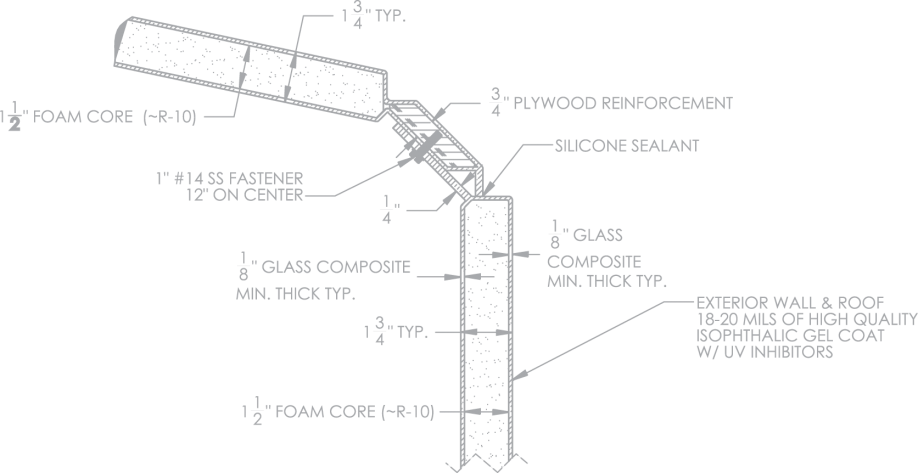Composites: The Trick to Modern, Lasting Building
Composites: The Trick to Modern, Lasting Building
Blog Article
The Function of Recycled Compounds: Enhancing Efficiency and Sustainability Initiatives
In today's ever-evolving landscape of products design and sustainability campaigns, the application of recycled compounds has actually become an engaging location of interest. These innovative products provide an one-of-a-kind mix of enhanced performance abilities and environmental benefits that hold significant guarantee for a large range of markets. By using the power of recycled compounds, companies can not just raise their operational performance and item top quality yet likewise add to an extra sustainable future. The elaborate interplay in between these compounds, performance metrics, and sustainability objectives paints a fascinating photo of potential innovations yet to be fully checked out.
Benefits of Recycled Composites
Recycled composites offer a lasting option that not just boosts efficiency yet also decreases environmental influence in different markets. One of the key benefits of making use of recycled compounds is their capacity to draw away waste from garbage dumps. By integrating products such as recycled plastics or carbon fiber right into making procedures, companies can minimize the amount of waste produced and promote a circular economy.
In addition, recycled compounds frequently show similar and even superior mechanical residential or commercial properties to virgin materials. This suggests that products made from recycled composites can maintain high performance requirements while being extra ecologically friendly. In addition, utilizing recycled compounds can help firms meet their sustainability objectives and reduce their carbon impact.

Efficiency Benefits of Recycled Compounds
Enhancing architectural stability and toughness, recycled composites supply significant performance advantages in different industrial applications. One considerable advantage is the boosted strength-to-weight proportion that reused compounds offer. This property is especially vital in markets such as aerospace, vehicle, and construction, where light-weight products that preserve high stamina are extremely demanded.

Furthermore, recycled compounds supply exceptional fatigue resistance compared to several standard products - composites. This characteristic is essential in industries subject to cyclic loading or dynamic stresses, as it helps prevent early failure and ensures long-lasting dependability
Additionally, recycled compounds can be customized to meet details performance demands by adjusting the kind and percentage of recycled products made use of in their production process. This customization ability permits the advancement of high-performance compounds that deal with the one-of-a-kind needs of various markets, further highlighting the performance try this website advantages of recycled composites.
Environmental Influence of Recycled Composites
The adoption of recycled composites in various markets has motivated a closer examination of their environmental influence. In comparison to conventional compounds, recycled composites provide the benefit of diverting waste from garbage dumps and lowering the demand for raw products removal.
By incorporating recycled products right into new composite products, companies can contribute to source preservation and waste decrease initiatives. Continued research study and development in this area are essential to optimize the ecological performance of recycled compounds and breakthrough sustainable practices across markets.
Applications of Recycled Compounds
Various industries have welcomed the utilization of recycled composites due to their flexibility and performance-enhancing properties. One of the key applications of recycled compounds remains in the auto sector, where they are made use of to make light-weight parts such as bumpers, interior panels, and under-the-hood parts. These compounds aid lower the general weight of vehicles, enhancing gas performance and decreasing carbon discharges.
In the building and construction field, recycled compounds are significantly being utilized to create weather-resistant and resilient building materials. These products provide high strength-to-weight ratios, making them ideal for applications such as roofing, cladding, and outdoor decking. Furthermore, making use of recycled composites in framework tasks, such as tunnels and bridges, has actually acquired grip because of their durability and resistance to deterioration.
Furthermore, the aerospace industry depends on recycled compounds to generate airplane components that call for high stamina and stiffness. These compounds play an important role in improving the efficiency and gas performance of airplane my latest blog post while lowering upkeep costs. In general, the diverse applications of recycled composites throughout industries highlight their substantial contribution to boosting sustainability efforts and boosting efficiency requirements.
Future Outlook for Recycled Composites
With an increasing concentrate on sustainability and development, the future overview for recycled composites in different markets shows up promising. As companies strive to fulfill ecological objectives and decrease their carbon impact, the demand for lasting materials like recycled compounds is expected to climb substantially. Industries such as vehicle, customer, aerospace, and building and construction items are increasingly transforming to recycled composites as a result of their lightweight, long lasting, and environmentally friendly residential or commercial properties.
In the automobile industry, using recycled compounds in car production is projected to raise as automakers seek to produce lighter and more fuel-efficient lorries. In the building sector, there is an expanding rate of interest in making use of recycled compounds for facilities tasks to lower waste and boost sustainability. The aerospace industry is likewise exploring the potential of recycled composites for airplane components to improve gas performance and lower discharges.
Conclusion
The applications of recycled compounds are huge, ranging from building and construction to top article automotive sectors. Relocating forward, the usage of recycled compounds is expected to continue to grow as sectors and business focus on sustainability initiatives in their operations.
In today's ever-evolving landscape of materials design and sustainability efforts, the usage of recycled composites has arised as a compelling location of interest. In comparison to standard composites, recycled composites provide the advantage of drawing away waste from land fills and decreasing the need for raw products extraction. By integrating recycled products into brand-new composite products, companies can contribute to source conservation and waste decrease initiatives.In the building market, recycled compounds are increasingly being used to develop resilient and weather-resistant structure products. As firms aim to satisfy ecological objectives and reduce their carbon footprint, the demand for sustainable products like recycled compounds is expected to rise dramatically.
Report this page